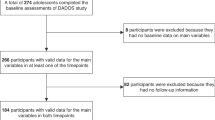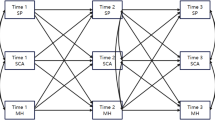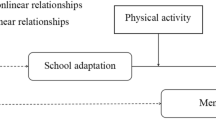Abstract
Background
School engagement and mental health are frequently linked, but within-person associations over time are largely unstudied. Emerging statistical techniques can better gauge how longitudinal changes in school engagement or mental health influence individual-level outcomes.
Methods
Two cohorts of students (recruited in 2017 or 2018) in 5 Los Angeles high schools completed baseline surveys at the high school transition and 3 annual follow-up surveys through 11th grade. Random-intercept cross-lagged panel models explored the strength and directionality of associations between school engagement (Student Engagement Instrument) and mental health (Mental Health Inventory).
Results
Among 431 participants, we observed between-person and within-person correlations between school engagement and mental health. Autoregressive effects of school engagement and mental health on future levels of these variables were identified, with more consistent effects in late high school. A single cross-lagged effect from mental health to school engagement across the high school transition was identified.
Conclusion
Decreased school engagement may signal corresponding cross-sectional changes in mental health, presenting opportunities for monitoring and intervention. Changes in school engagement or mental health may influence later within-person changes in these constructs, but associations are likely weaker and less consistent than previously assumed based on techniques that conflate between-person and within-person effects.
Impact
-
This study assesses bidirectional and longitudinal relationships between school engagement and mental health among rising high school students.
-
Both school engagement and mental health impacted future levels of these variables with stronger effects observed in the later high school years.
-
Relationships between school engagement and mental health were less frequently observed than in prior studies, with an effect of mental health on future school engagement seen only across the high school transition.
-
Interventions that promote both school engagement and mental health may be particularly beneficial, and the high school transition may be a promising time to leverage these.
This is a preview of subscription content, access via your institution
Access options
Subscribe to this journal
Receive 14 print issues and online access
$259.00 per year
only $18.50 per issue
Buy this article
- Purchase on SpringerLink
- Instant access to the full article PDF.
USD 39.95
Prices may be subject to local taxes which are calculated during checkout


Similar content being viewed by others
Data availability
Per the University of California, Los Angeles Institutional Review Board guidelines, the authors are unable to provide data from this study because it contains potentially identifying information, in addition to restrictions that research participants consented to. Further, the Committee for External Research Review has denied permission to share data as it contains potentially identifying information. Data sharing requests can be made to the UCLA South General Institutional Review Board at gcirb@research.ucla.edu.
References
Bradley, B. J. & Greene, A. C. Do health and education agencies in the United States share responsibility for academic achievement and health? A review of 25 years of evidence about the relationship of adolescents' academic achievement and health behaviors. J. Adolesc. Health 52, 523–532 (2013).
Braveman, P., Egerter, S. & Williams, D. R. The social determinants of health: coming of age. Annu. Rev. Public Health 32, 381–398 (2011).
Wong, M. D. et al. Turning vicious cycles into virtuous ones: the potential for schools to improve the life course. Pediatrics 149, e021053509M (2022).
Zajacova, A. & Lawrence, E. M. The relationship between education and health: reducing disparities through a contextual approach. Annu. Rev. Public Health 39, 273–289 (2018).
Fredricks, J. A., Blumenfeld, P. C. & Paris, A. H. School engagement: potential of the concept, state of the evidence. Rev. Educ. Res. 74, 59–109 (2004).
Appleton, J. J., Christenson, S. L., Kim, D. & Reschly, A. L. Measuring cognitive and psychological engagement: validation of the student engagement instrument. J. Sch. Psychol. 4, 427–445 (2006).
Park, N. The role of subjective well-being in positive youth development. Ann. Am. Acad. Political Soc. Sci. 591, 25–39 (2004).
Aldridge, J. M. & McChesney, K. The relationships between school climate and adolescent mental health and wellbeing: a systematic literature review. Int. J. Educ. Res. 88, 121–145 (2018).
Raniti, M., Rakesh, D., Patton, G. C. & Sawyer, S. M. The role of school connectedness in the prevention of youth depression and anxiety: a systematic review with youth consultation. BMC Public Health 22, 2152 (2022).
Allison, M. A., Attisha, E. & COUNCIL ON SCHOOL HEALTH The link between school attendance and good health. Pediatrics 143, e20183648 (2019).
Wong, M. D. et al. The role of social-emotional and social network factors in the relationship between academic achievement and risky behaviors. Acad. Pediatr. 17, 633–641 (2017).
Sieving, R. E. et al. Youth–adult connectedness: a key protective factor for adolescent health. Am. J. Prev. Med. 52, S275–S278 (2017).
Liu, Q., Xu, Y., Li, Y., Raat, H. & Jiang, M. Bidirectional associations between school connectedness and mental health problems in early adolescence: a cross-lagged model. Sch. Ment. Health 13, 730–742 (2021).
Datu, J. A. D. & King, R. B. Subjective well-being is reciprocally associated with academic engagement: a two-wave longitudinal study. J. Sch. Psychol. 69, 100–110 (2018).
Lester, L., Waters, S. & Cross, D. The relationship between school connectedness and mental health during the transition to secondary school: a path analysis. Aust. J. Guid. Couns. 23, 157–171 (2013).
Jose, P. E., Ryan, N. & Pryor, J. Does social connectedness promote a greater sense of well-being in adolescence over time?. J. Res. Adolesc. 22, 235–251 (2012).
Mulder, J. D. & Hamaker, E. L. Three extensions of the random intercept cross-lagged panel model. Struct. Equ. Model. Multidiscip. J. 28, 638–648 (2021).
Hamaker, E. L., Kuiper, R. M. & Grasman, R. P. A critique of the cross-lagged panel model. Psychol. Methods 20, 102–116 (2015).
Berry, D. & Willoughby, M. T. On the practical interpretability of cross-lagged panel models: rethinking a developmental workhorse. Child Dev. 88, 1186–1206 (2017).
Baribeau, D. et al. Application of transactional (cross-lagged panel) models in mental health research: an introduction and review of methodological considerations. J. Can. Acad. Child Adolesc. Psychiatry 31, 124–134 (2022).
Bernhardt, P. E. The advancement via individual determination (avid) program: providing cultural capital and college access to low-income students. Sch. Community J. 23, 203–222 (2013).
Dudovitz, R. N. et al. Outcome of the avid college preparatory program on adolescent health: a randomized trial. Pediatrics 151, e2022057183 (2023).
Wang, M. T. & Peck, S. C. Adolescent educational success and mental health vary across school engagement profiles. Dev. Psychol. 49, 1266–1276 (2013).
Lovelace, M. D., Reschly, A. L. & Appleton, J. J. Beyond school records: the value of cognitive and affective engagement in predicting dropout and on-time graduation. Prof. Sch. Couns. 21, 1096–2409 (2017).
Lovelace, M. D., Reschly, A. L., Appleton, J. J. & Lutz, M. E. Concurrent and predictive validity of the student engagement instrument. J. Psychoeduc. Assess. 32, 509–520 (2014).
Reschly, A. L., Betts, J. & Appleton, J. J. An examination of the validity of two measures of student engagement. Int. J. Sch. Educ. Psychol. 2, 106–114 (2014).
Appleton, J. J. in Handbook of Research on Student Engagement (eds Christenson, S., Reschly, A. & Wylie, C.) (Springer, 2012).
Rumpf, H., Meyer, C., Hapke, U. & Ulrich, J. Screening for mental health: validity of the MHI-5 using DSM-IV Axis I psychiatric disorders as gold standard. Psychiatry Res. 105, 243–253 (2001).
Berwick, D. et al. Performance of a five-item mental health screening test. Med. Care 29, 169–176 (1991).
Kidd, K. M. et al. Operationalizing and analyzing 2-step gender identity questions: methodological and ethical considerations. J. Am. Med Inf. Assoc. 29, 249–256 (2022).
Curran, P., West, S. & Finch, J. The robustness of test statistics to nonnormality and specification error in confirmatory factor analysis. Psychol. Methods 1, 16–29 (1996).
Schreiber, J. B. Core reporting practices in structural equation modeling. Res. Soc. Adm. Pharm. 4, 83–97 (2008).
Satorra, A. & Bentler, P. in Latent Variable Analysis 399–419 (Sage, 1994).
Wong, Z. Y., Liem, G. A. D., Chan, M. & Datu, J. A. D. Student engagement and its association with academic achievement and subjective well-being: a systematic review and meta-analysis. J. Educ. Psychol. 116, 48–75 (2024).
Upadyaya, K. & Salmela-Aro, K. Development of school engagement in association with academic success and well-being in varying social contexts. Eur. Psychol. 18, 136–147 (2013).
Lavy, S. & Naama-Ghanayim, E. Why care about caring? Linking teachers’ caring and sense of meaning at work with students’ self-esteem, well-being, and school engagement. Teach. Teach. Educ. 91, 103046 (2020).
Rodriguez-Fernandez, A. et al. Contextual and psychological variables in a descriptive model of subjective well-being and school engagement. Int. J. Clin. Health Psychol. 16, 166–174 (2016).
Borofsky, L. A., Kellerman, I., Baucom, B., Oliver, P. H. & Margolin, G. Community violence exposure and adolescents' school engagement and academic achievement over time. Psychol. Violence 3, 381–395 (2013).
Fowler, P. J., Tompsett, C. J., Braciszewski, J. M., Jacques-Tiura, A. J. & Baltes, B. B. Community violence: a meta-analysis on the effect of exposure and mental health outcomes of children and adolescents. Dev. Psychopathol. 21, 227–259 (2009).
Chen, S., Cardenas, D., Zhou, H. & Reynolds, K. J. Positive school climate and strong school identification as protective factors of adolescent mental health and learning engagement: a longitudinal investigation before and during COVID-19. Soc. Sci. Med. 348, 116795 (2024).
Gaxiola Romero, J. C., Pineda Dominguez, A., Gaxiola Villa, E. & Gonzalez Lugo, S. Positive family environment, general distress, subjective well-being, and academic engagement among high school students before and during the COVID-19 outbreak. Sch. Psychol. Int. 43, 111–134 (2022).
Etherson, M. E., Smith, M. M., Hill, A. P. & Flett, G. L. Feelings of not mattering and depressive symptoms from a temporal perspective: a comparison of the cross-lagged panel model and random-intercept cross-lagged panel model. J. Psychoeduc. Assess. 40, 60–76 (2021).
Burns, R. A., Crisp, D. A. & Burns, R. B. Re-examining the reciprocal effects model of self-concept, self-efficacy, and academic achievement in a comparison of the cross-lagged panel and random-intercept cross-lagged panel frameworks. Br. J. Educ. Psychol. 90, 77–91 (2020).
Chen, J., Huebner, E. S. & Tian, L. Longitudinal associations among academic achievement and depressive symptoms and suicidal ideation in elementary schoolchildren: disentangling between- and within-person associations. Eur. Child Adolesc. Psychiatry 31, 1405–1418 (2022).
Thapar, A., Collishaw, S., Pine, D. S. & Thapar, A. K. Depression in adolescence. Lancet 379, 1056–1067 (2012).
Hertz, M. F. et al. Adolescent mental health, connectedness, and mode of school instruction during COVID-19. J. Adolesc. Health 70, 57–63 (2022).
Viner, R. et al. School closures during social lockdown and mental health, health behaviors, and well-being among children and adolescents during the first covid-19 wave: a systematic review. JAMA Pediatr. 176, 400–409 (2022).
Dudovitz, R. N. et al. Assessment of exposure to high-performing schools and risk of adolescent substance use: a natural experiment. JAMA Pediatr. 172, 1135–1144 (2018).
Wong, M. D. et al. Association of attending a high-performing high school with substance use disorder rate and health outcomes in young adults. JAMA Netw. Open 5, e2235083 (2022).
Benner, A. D. The transition to high school: current knowledge, future directions. Educ. Psychol. Rev. 23, 299–328 (2011).
Loades, M. E. et al. Rapid systematic review: the impact of social isolation and loneliness on the mental health of children and adolescents in the context of COVID-19. J. Am. Acad. Child Adolesc. Psychiatry 59, 1218–1239.e1213 (2020).
Centers for Disease Control and Prevention. Youth Risk Behavior Survey Data Summary & Trends Report: 2013–2023. (U.S. Department of Health and Human Services, 2024).
Masselink, M. et al. The Longitudinal association between self-esteem and depressive symptoms in adolescents: separating between-person effects from within-person effects. Eur. J. Pers. 32, 653–671 (2018).
Orth, U., Clark, D. A., Donnellan, M. B. & Robins, R. W. Testing prospective effects in longitudinal research: comparing seven competing cross-lagged models. J. Pers. Soc. Psychol. 120, 1013–1034 (2021).
Sorjonen, K., Nilsonne, G., Melin, B. & Ingre, M. Uncertain inference in random intercept cross-lagged panel models: an example involving need for cognition and anxiety and depression symptoms. Personal. Individ. Differ. 201, 111925 (2023).
Funding
This work was supported by the National Institute of Child Health and Human Development [T32HD087162, T32HD071834, K23HD098277], the National Institute on Drug Abuse [K23DA040733-01A1], the National Institute on Alcohol Abuse and Alcoholism [K01AA027564], the Robert Wood Johnson Foundation [E4A 74086], the National Center for Advancing Translational Sciences [5KL2TR001856-09], and a UPMC Children’s Hospital of Pittsburgh Scholar Award. The content is solely the responsibility of the authors and does not necessarily represent the official views of the NIH. The funders had no role in the design and conduct of the study; collection, management, analysis, and interpretation of the data; preparation, review, or approval of the manuscript; or the decision to submit the manuscript for publication.
Author information
Authors and Affiliations
Contributions
Jacquelin Rankine conceived of and designed the study, analyzed the data, interpreted the results, drafted the manuscript, and approved of the final version to be published. Rebecca Dudovitz conceived of and oversaw all aspects of the study including data collection, data analysis, and interpretation of results, critically revised the manuscript, and approved of the final version to be published. Robert W.S. Coulter, Alison Culyba, Elizabeth Miller, Galen Switzer contributed to the study design, analysis plan, and interpretation of results, critically revised the manuscript, and approved of the final version to be published. Guadalupe Arellano, Erin Yoshida-Ehrmann contributed to data collection and interpretation of results, critically revised the manuscript, and approved of the final version to be published.
Corresponding author
Ethics declarations
Competing interests
The authors declare no competing interests.
Consent statement
All students eligible for study participation received a study enrollment packet including consent forms. Students returning a signed parental consent form and student assent form were enrolled in the study.
Additional information
Publisher’s note Springer Nature remains neutral with regard to jurisdictional claims in published maps and institutional affiliations.
Supplementary information
Rights and permissions
Springer Nature or its licensor (e.g. a society or other partner) holds exclusive rights to this article under a publishing agreement with the author(s) or other rightsholder(s); author self-archiving of the accepted manuscript version of this article is solely governed by the terms of such publishing agreement and applicable law.
About this article
Cite this article
Rankine, J., Coulter, R.W.S., Culyba, A. et al. School engagement and mental health in adolescence: longitudinal and bidirectional relationships. Pediatr Res (2025). https://doi.org/10.1038/s41390-025-04481-4
Received:
Revised:
Accepted:
Published:
Version of record:
DOI: https://doi.org/10.1038/s41390-025-04481-4
This article is cited by
-
Jacquelin Rankine: Early career investigator biocommentary
Pediatric Research (2025)



